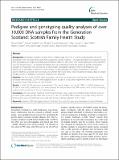Files in this item
Pedigree and genotyping quality analyses of over 10,000 DNA samples from the Generation Scotland : Scottish Family Health Study
Item metadata
| dc.contributor.author | Kerr, Shona | |
| dc.contributor.author | Campbell, Archie | |
| dc.contributor.author | Murphy, Lee | |
| dc.contributor.author | Hayward, Caroline | |
| dc.contributor.author | Jackson, Catherine Miriam | |
| dc.contributor.author | Wain, Louise | |
| dc.contributor.author | Tobin, Martin | |
| dc.contributor.author | Dominiczak, Anna | |
| dc.contributor.author | Morris, Andrew | |
| dc.contributor.author | Smith, Blair | |
| dc.contributor.author | Porteous, David | |
| dc.date.accessioned | 2013-08-07T14:31:01Z | |
| dc.date.available | 2013-08-07T14:31:01Z | |
| dc.date.issued | 2013-03-22 | |
| dc.identifier | 48916492 | |
| dc.identifier | eeb0d2b4-c0a3-4cc6-96af-c684b609a4ee | |
| dc.identifier | 000316806800001 | |
| dc.identifier | 23521772 | |
| dc.identifier | 84875132709 | |
| dc.identifier.citation | Kerr , S , Campbell , A , Murphy , L , Hayward , C , Jackson , C M , Wain , L , Tobin , M , Dominiczak , A , Morris , A , Smith , B & Porteous , D 2013 , ' Pedigree and genotyping quality analyses of over 10,000 DNA samples from the Generation Scotland : Scottish Family Health Study ' , BMC Medical Genetics , vol. 14 , 38 . https://doi.org/10.1186/1471-2350-14-38 | en |
| dc.identifier.issn | 1471-2350 | |
| dc.identifier.uri | https://hdl.handle.net/10023/3942 | |
| dc.description.abstract | Background Generation Scotland: Scottish Family Health Study (GS:SFHS) is a family-based biobank of 24,000 participants with rich phenotype and DNA available for genetic research. This paper describes the laboratory results from genotyping 32 single nucleotide polymorphisms (SNPs) on DNA from over 10,000 participants who attended GS:SFHS research clinics. The analysis described here was undertaken to test the quality of genetic information available to researchers. The success rate of each marker genotyped (call rate), minor allele frequency and adherence to Mendelian inheritance are presented. The few deviations in marker transmission in the 925 parent-child trios analysed were assessed as to whether they were likely to be miscalled genotypes, data or sample handling errors, or pedigree inaccuracies including non-paternity. Methods The first 10,450 GS:SFHS clinic participants who had spirometry and smoking data available and DNA extracted were selected. 32 SNPs were assayed, chosen as part of a replication experiment from a Genome-Wide Association Study meta-analysis of lung function. Results In total 325,336 genotypes were returned. The overall project pass rate (32 SNPs on 10,450 samples) was 97.29%. A total of 925 parent-child trios were assessed for transmission of the SNP markers, with 16 trios indicating evidence of inconsistency in the recorded pedigrees. Conclusions The Generation Scotland: Scottish Family Health Study used well-validated study methods and can produce good quality genetic data, with a low error rate. The GS:SFHS DNA samples are of high quality and the family groups were recorded and processed with accuracy during collection of the cohort | |
| dc.format.extent | 7 | |
| dc.format.extent | 424356 | |
| dc.language.iso | eng | |
| dc.relation.ispartof | BMC Medical Genetics | en |
| dc.subject | Genetics | en |
| dc.subject | SNP Genotyping | en |
| dc.subject | Parent-child trios | en |
| dc.subject | Error rate | en |
| dc.subject | Non paternity | en |
| dc.subject | Generation Scotland | en |
| dc.subject | Biobank | en |
| dc.subject | QH426 Genetics | en |
| dc.subject.lcc | QH426 | en |
| dc.title | Pedigree and genotyping quality analyses of over 10,000 DNA samples from the Generation Scotland : Scottish Family Health Study | en |
| dc.type | Journal article | en |
| dc.contributor.institution | University of St Andrews. School of Medicine | en |
| dc.identifier.doi | 10.1186/1471-2350-14-38 | |
| dc.description.status | Peer reviewed | en |
| dc.identifier.url | http://www.biomedcentral.com/1471-2350/14/38 | en |
This item appears in the following Collection(s)
Items in the St Andrews Research Repository are protected by copyright, with all rights reserved, unless otherwise indicated.

